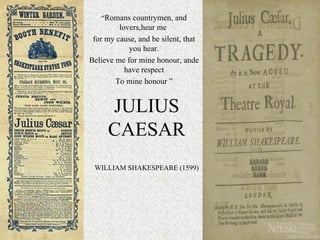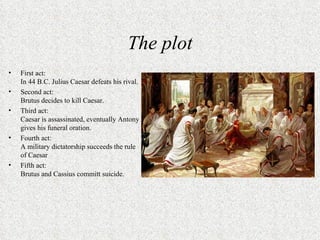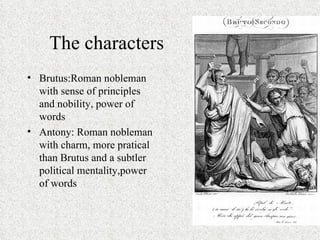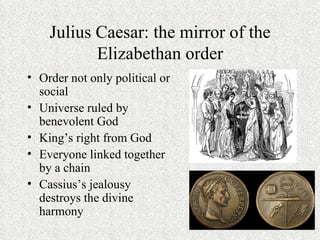Julius caesar
- 1. “Romans countrymen, and lovers,hear me for my cause, and be silent, that you hear. Believe me for mine honour, ande have respect To mine honour ” JULIUS CAESAR WILLIAM SHAKESPEARE (1599)
- 2. The plot • First act: In 44 B.C. Julius Caesar defeats his rival. • Second act: Brutus decides to kill Caesar. • Third act: Caesar is assassinated, eventually Antony gives his funeral oration. • Fourth act: A military dictatorship succeeds the rule of Caesar • Fifth act: Brutus and Cassius committ suicide.
- 3. Julius Caesar: the title character Julius Caesar: •Protagonist of the play •Focus of the discussion •Reason for the revange •Julius Caesar: past; conspiracy: future and desire for freedom
- 4. The characters • Brutus:Roman nobleman with sense of principles and nobility, power of words • Antony: Roman nobleman with charm, more pratical than Brutus and a subtler political mentality,power of words
- 5. The rhetoric of politics • Rhetoric:maker of history,irony and rhetoric forms are ideological-political values in persuading,convincing
- 6. Ambition in public man • Ambition:problem of goodness and honestly in people having public roles (for this reason Antony defeats the “clever”Brutus)
- 7. Julius Caesar: the mirror of the Elizabethan order • Order not only political or social • Universe ruled by benevolent God • King’s right from God • Everyone linked together by a chain • Cassius’s jealousy destroys the divine harmony
- 8. The power of monarchy • Historical play about a political assassination • Historical plays were popular at Shakespeare’s time • Nowadays democracy, Shakespeare’s time strong rulers







